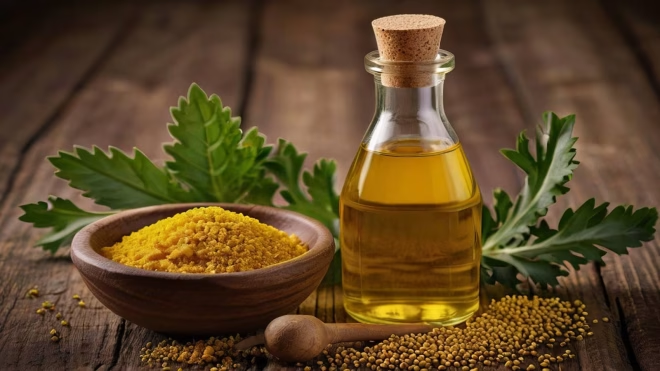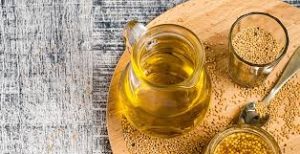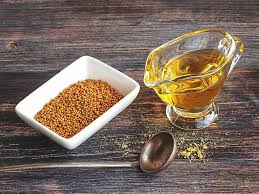
Mustard Oil for Cooking: Good or Bad?
Mustard oil is one of the most widely used cooking oils. But is it healthy? Learn 8 mustard oil benefits, side effects and how to use it.
Mustard oil is often used in everyday cooking, especially in some dishes. Made from mustard seed, this oil contains omega-3 and omega-6 fatty acids that are good for the heart. It is also good for the skin and hair and even helps reduce pain and inflammation. It is also known to improve blood circulation and help cure colds. With so many uses, it is no wonder that mustard oil has become a kitchen staple! However, it is important to remember that mustard oil should be consumed in moderation to avoid side effects.

What are the benefits of mustard oil?
Mustard oil is powerful and has been used for centuries for its medicinal, culinary and cosmetic properties. Let’s take a closer look at the benefits of incorporating mustard oil into your routine:
1. Good for the skin
Mustard Oil is rich in essential fatty acids such as omega-3 and omega-6, which are beneficial for healthy skin. Its nourishing properties help moisturize dry skin, reduce pigmentation and even improve skin beauty. It can also help heal acne and burns due to its antibacterial properties when used regularly.
2. Promote hair growth
Mustard oil promotes hair growth. It contains a lot of vitamins A and E, which are important for the health and hydration of your hair. Massaging it into your head increases blood circulation and makes your hair stronger and shinier. A study published in the International Journal of Trichology said that oils like mustard oil can reduce hair loss and strengthen hair follicles.
3. Reduce pain
Mustard oil has anti-inflammatory properties and is an effective remedy for pain and inflammation in muscles and joints. A study published in the Archives of Medical Research says that the anti-inflammatory properties of mustard oil can be attributed to its high content of alpha-linolenic acid (ALA), which can reduce inflammation in the body caused by diseases such as arthritis. It is also used in traditional Ayurveda to relieve body pain. However, do not use too much as it will irritate the skin.
4. Reduce growth of cancer cells
Research has shown that using mustard oil may help slow the growth and spread of certain types of cancer. A study published in the journal Cancer Letters showed that mice fed on pure mustard oil were more effective at inhibiting the growth of cancer cells than mice fed on corn oil or fish oil. In addition, mustard oil’s antioxidant content may help eliminate harmful free radicals in the body, reducing the risk of other types of cancer.
5. Supports heart health
Mustard oil is most popular in Indian and Mediterranean cuisine. It contains monounsaturated and polyunsaturated fatty acids, which are considered good fats. These fats can help lower bad cholesterol (LDL) and increase good cholesterol (HDL), which can reduce the risk of heart disease. A study published in the Journal of Nutrition shows that these healthy fats can help reduce triglycerides, high blood pressure, and diabetes, all of which are risk factors for heart disease.
6. Reduce pain
Inflammation is the root cause of many diseases, and mustard oil has properties that help reduce inflammation. The omega-3 fatty acids, including alpha-linolenic acid in mustard oil, can reduce inflammation, which may be especially helpful for people with conditions like arthritis, asthma, or skin problems. In addition to its anti-inflammatory properties, mustard oil also has antibacterial and antifungal properties that help reduce joint pain.
6. Good for colds and coughs
Mustard oil is often used to treat colds, coughs, and other respiratory problems. The aromatic scent of this oil can help open nasal passages and act as a natural decongestant. According to research published in the International Journal of Multidisciplinary Research and Development, the oil’s warming properties can reduce symptoms of respiratory diseases caused by mucus and reduce nasal congestion. One application is to mix warm mustard oil with a little garlic and apply it to the chest and under the nose to relieve pain. Mustard oil can also be added to boiling water for inhalation, which helps to loosen mucus.
8. It has a lot of smoke
For those who like to cook with mustard oil, it has a high smoke point of around 250°C (480°F), making it ideal for frying or sautéing. The high smoke point means that the oil does not break down into solid particles like other oils when exposed to heat. This makes mustard oil safer for cooking, especially in spicy dishes.

Are there any side effects of mustard oil?
Although mustard oil has many benefits, it is worth noting that it also has some side effects.
1. Skin irritation
Mustard oil can irritate the skin, especially in people with sensitive skin. It contains chemicals such as allyl isothiocyanate, which can cause redness, itching or rash. To prevent this, it is recommended to do a patch test. Apply a small amount of oil to a small area of skin and observe the blemish for 24 hours.
2. Allergic reaction
Although very rare, some people can be allergic to mustard oil. Symptoms of an allergic reaction can include itching, swelling, itching and severe pain, and anaphylaxis, which is a life-threatening condition that requires immediate medical attention. If you have symptoms such as difficulty breathing or shortness of breath, avoid mustard oil and seek emergency medical attention if your face and throat are swollen.
3. Heart disease
While mustard oil is widely used in Asia, especially India, and is considered heart-healthy, according to research published in the Journal of Clinical Lipidology, mustard oil contains erucic acid, which can be harmful when consumed in excess. High levels of erucic acid have been linked to heart health problems such as myocardial lipidosis, a condition in which there is too much fat in the heart cells. Do not use regularly or excessively.
4. Digestive problems
Mustard oil is very strong and can cause indigestion when consumed in large quantities. Excessive use can cause symptoms such as nausea, abdominal pain and diarrhea. You need to consume it in moderation to avoid these problems. A study published in Cancer Letters shows that mustard oil increases the risk of cancer by 50%.
5. Eye irritation
Mustard oil can be very irritating if it gets in the eyes. It can cause burning, redness and discomfort. If the oil gets in your eyes, rinse thoroughly with water and seek medical attention if irritation occurs.
Who should avoid mustard oil?
Mustard is safe in small amounts, but some people should avoid it altogether:
1. People with mustard allergies
People with mustard allergies should not use mustard oil because it can cause an allergic reaction, causing symptoms such as swelling, itching, and redness.
2. Pregnant women and those with heart disease
Only those who are allergic to mustard, pregnant women, and those with heart disease should use it with caution. The U.S. FDA recommends that mustard oil be applied only topically due to concerns about erucic acid, a compound that may affect heart disease. While there is no evidence that mustard is harmful to pregnant women or people with heart disease, it is best to avoid mustard to reduce adverse effects.

How to use mustard oil?
Mustard oil has 5 additional uses along with cooking:
1. Using for the skin
Mustard Oil is a natural moisturizer that nourishes and hydrates your skin! Apply a few drops to your hands and massage into your skin. It is good for reducing pigmentation and softening the skin. It also promotes blood circulation.
2. For Hair
If you want long, healthy hair, you should massage your head with mustard oil. It helps strengthen the scalp and hair, prevent dandruff and promote hair growth. Apply mustard oil to your scalp and hair, leave it for 30 minutes or overnight and then wash it off. You can try mustard oil hair mask. Heat mustard oil and crushed curry leaves. Massage the mixture into your scalp and hair and wash it off after 30 minutes.
3. For Massage
Warm mustard oil is great for massage because it can help relieve sore muscles or body aches. When you apply it to your skin and massage it in, it will help to increase blood circulation and reduce stiffness.
4. Ear ache
Warm some oil slightly and put a few drops in your ear. Its antibacterial and antifungal properties reduce the risk of ear infections, and its laxative and lubricating properties help soften the ear, making it easier to remove.
5. Cooking
Mustard oil is widely used in cooking. It adds a rich, tangy flavor to foods and can be used for frying, stir-frying, or drizzling over salads, but only in moderation.
While mustard is widely used in some countries, you can’t ignore the fact that it is still banned in some countries, such as the United States. So it is recommended to choose less erucic acid and consume in moderation. Also, if you already have heart disease, talk to your doctor before consuming mustard oil.
